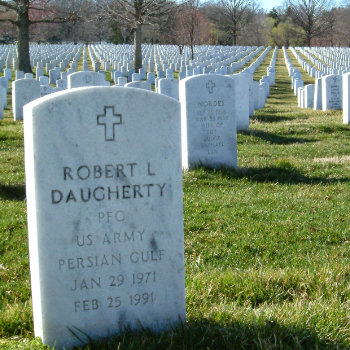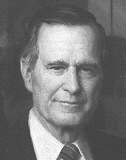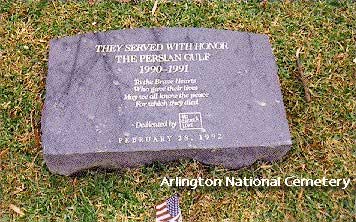33 years later...
It has been 12,245 days since the start of the 1991 Gulf War (January 16, 1991). The next major milestone (12,500 day) will be on April 7, 2025.
January 16, 2024 will be the 33rd anniversary of the start of the 1991 Gulf War.
Check out other various dates in the 1991 Gulf War Timeline.
Quotes About the 1991 Gulf War
"Iraq went from the fourth-largest army in the world to the second-largest army in Iraq in 100 hours"
-Lieutenant General Tom Kelly
"I have seen in your eyes a fire of determination to get this war job done quickly. My confidence in you is total, our cause is just. Now you must be the thunder and lighting of Desert Storm."
- General Schwarzkopf
Casualties of the 1991 Gulf War
A quick look at some of the casualties that both sides suffered during the 1991 Gulf War. These numbers come from a variety of sources. Many human rights groups claimed a much higher numbers of Iraqi were killed in action.
|
The United States suffered:
|
In June 1991, the U.S. estimated that more than
|
World Reaction
On Aug. 2, 1990, Iraqi military forces,
on orders from President Saddam Hussein, invaded and occupied the small
country of Kuwait. The Persian Gulf War of 1991--from January 16 to February
28--was fought to expel Iraq and restore Kuwaiti independence.
The war introduced several technologically advanced weapon systems. As
well,the United States forged a broad-based international coalition that
confronted Iraq militarily strategy.
The military coalition consisted of: [See the Detailed Contribution list]
Afghanistan, Argentina, Australia, Bahrain, Bangladesh, Belgium, Canada, Czechoslovakia, Denmark, Egypt, France, Germany, Greece, Hungary, Honduras, Italy, Kuwait, Morocco, The Netherlands, New Zealand, Niger, Norway, Oman, Pakistan, Poland, Portugal, Qatar, Saudi Arabia, Senegal, South Korea, Spain, Syria Turkey, The United Arab Emirates, The United Kingdom, and the United States.
The war also was financed by countries that were unable to send in troops.
More than $53
billion were pledged and received. Saudi Arabia and Kuwait were the largest
donors. Switzerland
also contributed to the allies, this after being neutral during both World
War I and World War II.
The attack on Kuwait by Iraq caused the United Nations Security Council to pass several resolution to close Iraq from International trade. The Security Council wanted President Saddam Hussein removed his troops from Kuwait and to distroy nonconventional weapons. Read about two of the most importaint ones: Resolution 660, first resolution after the attack, and 678, to use all necessary means to free Kuwait.
War Summary
The Iraqi armed forces had extensive experience of warfare. They had just brought an eight year war with Iran to a successful conclusion. The Coalition troops, on the other hand, were largely inexperienced. Britain had found the Falklands War with marines and paratroopers; this war was fought with tanks and mechanized infantry instead. The Syrians had fought within the last decade in Lebanon, but the 9th Division had not been involved. The Egyptians had last fought a war in 1973, shortly after the US had wound down its involvement in Vietnam. Of the gulf states, only Omani Army had anything approaching extensive combat experience.
One reason that the Iraqis' experience did them little good was that it was the wrong kind of experience. They had plenty of experience in fighting a positional war of wearing down Iran forces. Instead of helping, this was a positive disadvantage when fighting a mobile campaign; they would have been better off starting fresh without a lot of bad habits.
Of Iraq's 545,000 troops in the Kuwait Theater of Operations, about 100,000 are believed to have lost their lives. Of IRaq's 44 army divisions, 42 were found to be combat ineffective. By the end of the war, estimated losses of equipment were as followed:
| Total Equipment | ||||
|---|---|---|---|---|
| Iraqi | Coalition | |||
| Lost | On hand | Lost | On hand | |
| Tanks | 4,000 | 4,230 | 4 | 3,360 |
| Artillery | 2,140 | 3,110 | 1 | 3,633 |
| Armored Personal Carriers | 1,856 | 2,870 | 9 | 4,050 |
| Helicopters | 7 | 160 | 17 | 1,959 |
| Aircraft | 240 | 800 | 44 | 2,600 |
After the War

The war created a new opportunity for peacemaking in the Middle East. Shortly after the Iraqi invasion President Bush announced that once the Iraqi forces vacated Kuwait, he would increase efforts to Middle East peace process.
After the war, Secretary of State James Baker undertook several trips to the Middle East in an effort that resulted of an international conference on Arab-Israel peace jointly sponsored by the United States and the Soviet Union in Madrid in October 1991. The increased Arab readiness to participate in such talks--representatives of Egypt, Jordan, Lebanon, Saudi Arabia, and Syria as well as a Palestinian delegation participated--brought together by the war.
The after effects of the war also enabled the United States to forge closer cooperation with certain regional allies that participated in the coalition. The U.S. signed new defense agreements with several coalition members providing for joint exercises, training, and prepositioning of military equipment. These enabled the administration of U.S. President Bill Clinton to react quickly and decisively when Iraq threatened Kuwait briefly in October 1994 by moving troops toward the Kuwait border.
Did You Know
On the final night of the war--within hours of the cease-fire--two U.S. Air force bombers dropped specially designed 5,000-pound bombs on a command bunker fifteen miles northwest of Baghdad in a deliberate attempt to kill Saddam Hussein.
The decision to seek United Nations involvement was part of a larger, more cynical strategy of the Bush administration to circumvent Congress, to bypass the constitutional authority of Congress--and only Congress--to declare war.
During the very week King Fahd was persuaded to invite U.S. troops to Saudi Arabia in order to defend his monarchy from the alleged threat of an Iraqi invasion, a U.S. intelligence officer who was secretly sent to Kuwait by General H. Norman Schwarzkopf reported that Iraq had began withdrawing its Republican Guard divisions from Kuwait entirely.
Several weeks before the Baghdad was bombed on January 17th, 1991, U.S. intelligence agents successfully inserted a computer virus into Iraq's military computers. It was designed to disable much of Baghdad's air-defense system.
The largest tank battle of the war, which has previously has gone unreported in any detail, conclusively demonstrated the superiority of American tanks and fighting doctrine over that of the Soviets. As a whole, the battles of the ground war showed that American military maneuverability clearly outclassed the plodding tactics of the Iraqis, who emphasized pitched engagements and linear movements as they had been taught by their Soviet advisers.
The size of the Iraqi army in the Kuwait Theater of Operations was probably much smaller than claimed by the Pentagon. On the eve of the war, Iraq may have had as few as 300,000 solders, compaired to 540,000 estimated by the Pentagon.
In official reports, the Pentagon has admitted that of the 148 American servicemen and women who perished on the battlefield, 24 percent of the total killed in action were victims of 'friendly fire'. Eleven more Americans were killed when un exploded Allied munitions blew up, raising the 'friendly fire' percent to 31 percent. Most solders said that the thousands of unexploded mines and bomblets they encountered, were more dangerous than enemy fire.
On January 29 1991, an Iraqi force, apparently comprising two infantry and one tank battalions, crossed the Kuwait border in the south-eastern front and headed in the direction of Khafji, a deserted Saudi town, some 12 miles from the frontier. Taking the small Saudi garrison by surprise, the Iraqis occupied the town and resisted allied attempts to dislodge them for nearly two days. In the ensuing fighting the Americans suffered their first casualties in ground fighting when 11 marines were killed (7 of them from friendly fire). The Iraqi losses in men and equipment were far higher, amounting to dozens of dead and hundreds of prisoners.
Did you know the US had war games in California Mohave desert in February 1990, almost a year before the military coalition attacked Iraq?
Read and hear the internet exclusive 'Sounds of 1990' and learn all about the 'Deserts Winds of War' as it aired on Christmas eve in 1990, twenty days before the military coalition started bombing in Iraq.
Check out the Iraqi map of key military points.
Links
- U.S. War Veteran Memorials and Monuments - This guide provides information on each memorial or monument, where it's located, and how you can tour through them, both virtually and in person. Showing respect for our veterans is a foundational aspect of American culture, and its important that we find ways to thoughtfully honor their contributions.
- Financial Resources and Discounts for Military Families - Useful guide to all sorts of discounts available for military families.
- 75+ Exciting Military and Veteran Discounts in 2020 - Useful guide to help Veterans and thier families to get some amazing discounts.
- Cheap Car Insurance for Veterans (With Rates) - Easily find practical car insurance programs for Veterans.
- Guide to Clinical Trials for Asbestos - An ongoing resource on the latest Asbesto's clinical research study.
- Substance Abuse Resources for Veterans - A useful guide that offers an in-depth look at overcoming substance misuse for veterans.
- Veteran Tips And Resources For Investing In Real Estate - A useful guide to help veterans looking to buy a new home.
- Small Business Loans - Simple guilde for veteran's small businesses loans.
- Tips & Resources for Helping Veterans with PTSD - Bradley University Online wants to help veterans, active-duty members, and their families and friends understand more about the complexities of PTSD and the techniques and strategies that can help someone struggling with it find strength and peace in their lives and careers.
- What Veterans Should Know About Sleep - Understand the challenges that some veterans face with sleeping.
Mesothelioma
Mesothelioma is cause by prolong exposure to asbestos. Veterans should be aware of this rare form of cancer as some military personal have been around asbestos in overseas actions.
Learn more about options for Veterans on the Mesothelioma page.
Multimedia Section
 President Bush waited two days after the UN deadline for Iraqi withdrawal from Kuwait before ordering the Coalition to begin action against Iraqi forces. The Winds of Desert Storm began howling across Iraq at 0230 hours Baghdad time. This is how President Bush announced the start of Desert Storm to the World. [Real Audio] 40k |
 This is President Ronald Reagon at a press conference explaining why he doesn't think the War Powers Act is Consitutional. Do you think a President has a right to use troops for military actions without the approval of congress? Here is Ronald Reagon with the answer. [Real Audio] 98k |

